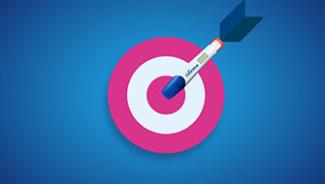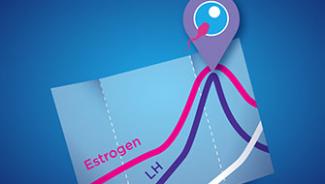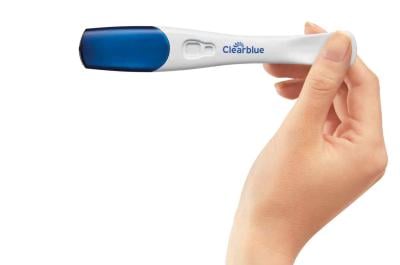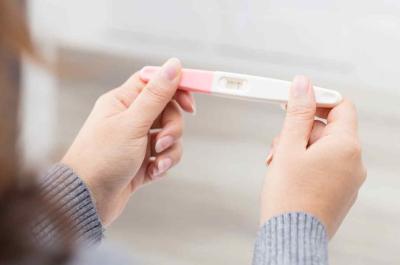Common foods and drinks: What can affect a pregnancy test result?

Many women wonder what can affect a pregnancy test result, particularly what they eat or drink before taking one. Waiting for that test result can feel momentous — and it’s perfectly normal to want to make sure you did everything right. The good news? Most of what you eat and drink has little to no effect on your home pregnancy test results.
Home pregnancy tests detect human Chorionic Gonadotropin (hCG), a hormone produced during pregnancy. When a fertilised egg implants into your uterine wall, the placenta begins to grow, releasing hCG into your bloodstream.1,2 Different foods and drinks don’t affect the amount of hCG present in your urine. However, the amount of liquid you consume, as well as certain medications, can cause issues. Let’s explore this topic some more.
Can drinking too much water affect a pregnancy test?
Yes! Drinking too much water — or any liquid — can affect a pregnancy test. The hormone hCG is more concentrated in your urine first thing in the morning. If you haven’t missed your period yet, your hCG level may not be high enough to be detected in more diluted urine. However, you can test any time of day if you’ve already missed your period; if you are pregnant, your hCG level will be high enough to give a positive result at any time of day. If you haven’t missed your period, you took a home pregnancy test and it was negative — and you drank an excessive amount of fluids before you took the test — consider taking another test tomorrow using your first urine of the day.
Can alcohol affect a pregnancy test?
Sometimes your most pressing questions, like When was my last period?, can occur to you when you’re a little tipsy. You may be tempted to take a pregnancy test right away, and you might be wondering if alcohol will affect the result. The short answer is no — alcohol does not interfere with the result.
However, alcohol can make you dehydrated, which in turn can make you drink more liquids. Drinking too many liquids can dilute your urine, making it more difficult for your home pregnancy test to detect the presence of hCG if it’s early in your pregnancy. Also, if you’re trying to conceive, it’s recommended that you avoid alcohol completely.3
Can weed affect a pregnancy test?
Cannabis won’t affect the outcome of a home pregnancy test. However, the chemicals in cannabis (particularly tetrahydrocannabinol, or THC) can harm a fetus.4 If it’s medically prescribed, don’t stop using it without speaking to your healthcare provider first. But if you’re trying to conceive, do not use non-medically prescribed weed.
Can caffeine affect a pregnancy test?
Caffeine doesn’t impact your hCG level at all. However, like alcohol, drinking caffeine can make you feel dehydrated and cause you to drink more liquids. As in our other examples, drinking too many liquids can dilute your urine, making it difficult for your home pregnancy test to detect the presence of hCG. If you’re trying to conceive and it’s time to test, use your first morning urine — and then have your cup of coffee.
Can certain foods affect a pregnancy test?
No. While there are foods you'll want to eat and avoid once you’ve confirmed you’re pregnant, what you’ve eaten (or not eaten) before you take a pregnancy test won’t impact its ability to detect hCG.
Can certain medications affect a pregnancy test?
Some fertility treatments require hCG injections, which can lead to false positives. Medications containing hCG can affect the result, too. Your home pregnancy test should not be affected by hormone therapies containing clomiphene citrate, common painkillers, alcohol, antibiotics or the contraceptive pill. Always read the manufacturers’ instructions for any medication you are taking before testing. If you get unexpected results, you should discuss them with your doctor.
Sources
- Healthwise, “Human Chorionic Gonadotropin (HCG),” (Oct. 8, 2020), University of Michigan Health, Michigan Medicine, https://www.uofmhealth.org/health-library/hw42062.
- “What is HCG?” (n.d.), American Pregnancy Association, https://americanpregnancy.org/getting-pregnant/hcg-levels/.
- “Fetal Alcohol Spectrum Disorders (FASDs),” (January 11, 2022), Centers for Disease Control and Prevention, https://www.cdc.gov/ncbddd/fasd/faqs.html.
- “What You Need to Know About Marijuana Use and Pregnancy,” (March 16, 2018), Centers for Disease Control and Prevention, https://www.cdc.gov/marijuana/factsheets/pregnancy.htm.

Accuracy when you need it most
No brand is more accurate: our Pregnancy Tests are over 99% accurate from the day you expect your period, for confidence when you need it most.

How to get pregnant faster
There are a few key things you need to know if you want to maximise your chances of getting pregnant.




